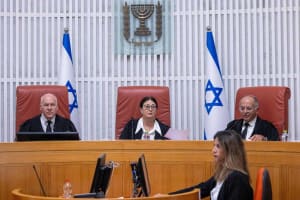Can the Israeli Supreme Court exercise judicial review over Basic Laws?
Basic Laws have functioned as a quasi-constitution in Israel due to the nation's lack of a written constitution

Following the High Court’s decision to issue a temporary injunction against the coalition’s amendment to the Incapacitation Law, several coalition leaders claim that the High Court lacks the authority to exercise judicial review of Basic Laws.
“The court does not have the authority to cancel Basic Laws and does not have the authority to determine that the Basic Law will come into force at a later period,” according to a statement issued by the coalitionheads.
“Nor does any court have the authority to overturn the election results and allow a prime minister to be incapacitated, which fundamentally nullifies democracy.”
Basic Laws have functioned as a quasi-constitution in Israel due to the lack of a written constitution.
In 1995, former Supreme Court leader Aharon Barak enshrined the principle that Basic Laws have a special status in Israel. Based upon his constitutional theory in an opinion in a case called Bank Mizrachi, Barak gave the court its current authority to strike down regular parliamentary legislation.
However, on Monday, several members of the Israeli Law Professors’ Forum for Democracy challenged the coalition’s interpretation of the court’s authority to review Basic Laws.
In their statement, the group explained that Basic Laws are legislated in the same way as all other Knesset laws. Thus, the principle of judicial review applies to them.
While the opposition to the judicial reform embraces this principle, it also claims that giving the headline ‘Basic Law’ to a law that was passed with 61 Knesset votes is not enough to disqualify it from judicial review.
The group argued that the coalition is attempting to protect laws from judicial review by calling them Basic Laws.
“The meaning of the coalition heads’ declaration is that the coalition majority can immunize any action from judicial review by giving it a headline of ‘Basic Law,'” the statement read.
“Without a constitution and without self-restraint, the coalition seeks to be a single authority above all: constituent, legislative, executive and now judicial,” the lawyers wrote.
“The words 'Basic Law' are not a magic key that locks every door of judicial review, otherwise any law can be called a Basic Law and thus immunize any unacceptable norm from judicial review,” according to the statement.
However, reform supporters consider this to be a double standard. They say one cannot use the same argument to make two different contradictory cases.
Doron Nehemia, one of the founders of ‘Nativ BaLikud,' an organization that seeks to promote a 'national and liberal agenda' within the Likud party, wrote that this method is not only wrong but also “dishonest, hypocritical and contradictory.”
“It pulls the carpet from under the thesis that wants to give the court limitless power,” Nehemia wrote on Facebook. “The only power that the court has to overturn legislation stems from the headline that the Knesset has given to Basic Laws and not any other thing… Once you claim that the headline ‘Basic Law’ is not enough to create a constitutional norm – you inevitably deny the authority of the court to invalidate laws passed by the Knesset.”
The group also condemned Prime Minister Benjamin Netanyahu's recent comment saying that the coalition would pass the Judicial Selection Committee bill and then stop other reforms.
“From comparative experience, we know that after the Judicial Selection Committee ceases to be independent and objective, there is nothing that will stand in the way of the government,” the group warned.
Prof. Yaniv Roznai, a member of the forum, spoke with Israel's N12 news about the current situation in Germany, which has both a constitution and Basic Law.
“There is a rigid constitution there, there is a Basic Law, but there is also what we call the Eternity Clause. There is a clause in the Basic Law that says that even when the constitution is amended, it is impossible to influence the basic characteristics of the state as a constitutional democracy, and characteristics such as human dignity.”
Since Israel lacks such a clause, the forum argues that the role of the High Court is to preserve the democratic character of the state and protect human rights.
Next month, the High Court will convene two hearings related to the judicial reforms: An unprecedented session for all 15 justices to hear arguments against the Reasonableness Standard Law, and an expanded judicial hearing on the amendment to the Incapacitation Law.

The All Israel News Staff is a team of journalists in Israel.
You might also like to read this:
















